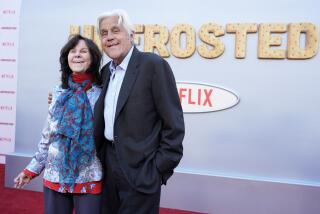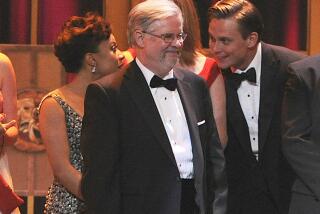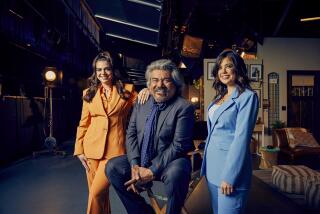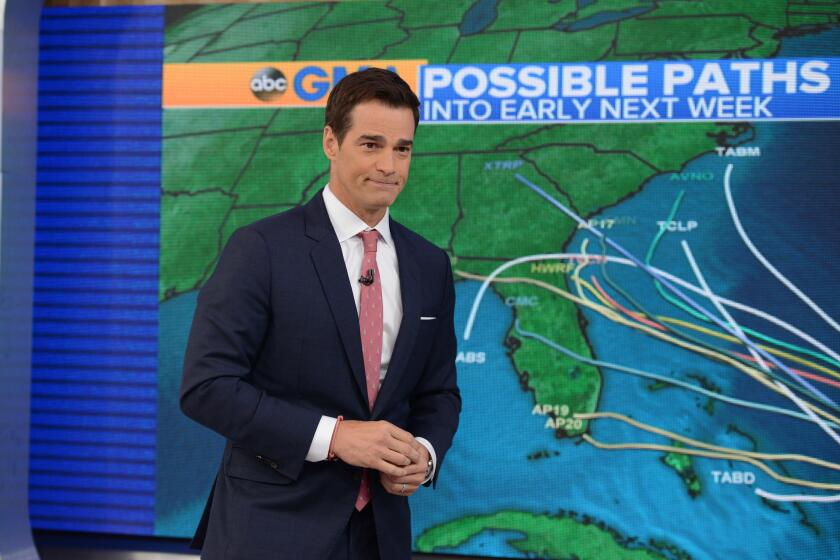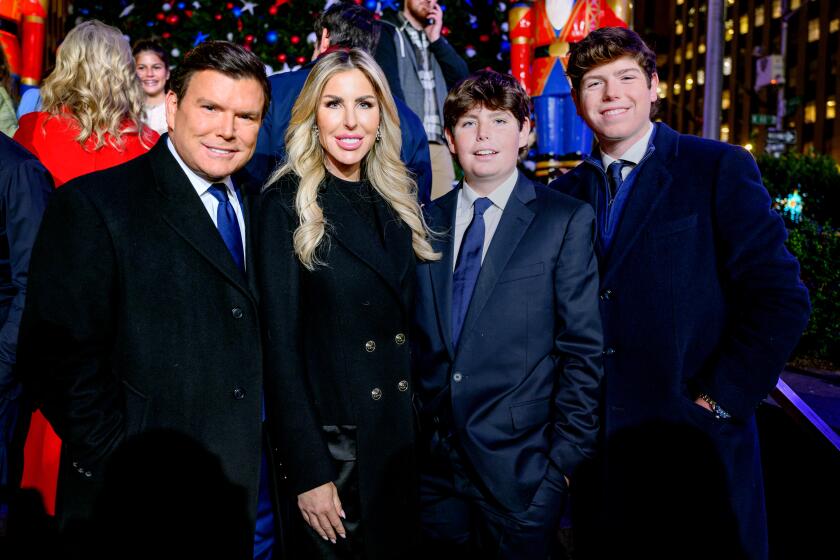Critic’s Notebook: Death, cancer and love: How comedian Tig Notaro made it through a series of life-altering events
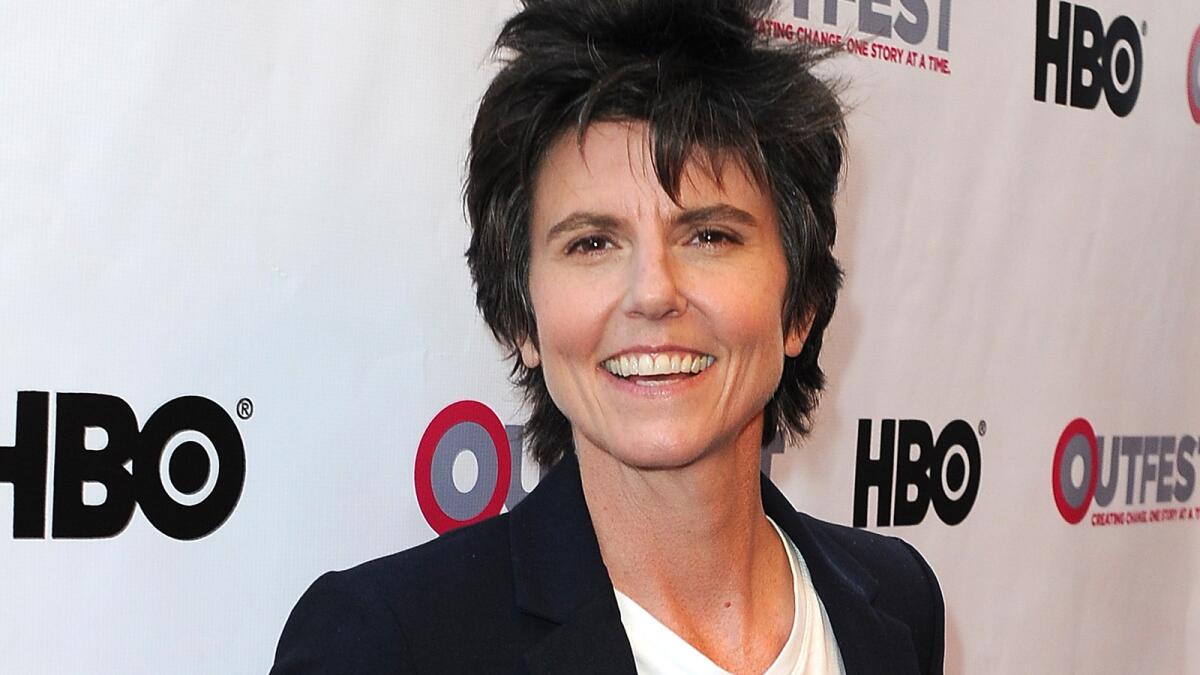
Comedian Tig Notaro arrives at the opening night gala of “Tig” at the 2015 Outfest Los Angeles LGBT Film Festival on July 9, 2015.
A couple of weeks back, in the July 3 edition of The Times Sunday Calendar, I wrote about and spoke with the brilliant comedian Tig Notaro, the subject of a new documentary, “Tig,” that has just premiered on Netflix. (You can read Mary McNamara’s review here.) Directed by Kristina Goolsby and Ashley York, the film is an often difficult but ultimately sweet and moving account -- and a funny one, too, of course -- that follows Notaro through a life-threatening, life-altering time: It began with the 2012 hospitalization for a potentially fatal bacterial infection (C. diff, or Clostridium difficile colitis), followed in short order by the unexpected death of her mother, followed in equally short order by a diagnosis of breast cancer that led to a double mastectomy (and a subsequent clean bill of health) but first became the subject of a comedy set, at L.A.’s Largo, that made Notaro a famous rather than merely a successful comic. The film follows on from there, through her attempts to have a child and the halting progress of a relationship with actress Stephanie Allyne (who is now her fiance).
As is usually the case, there was more talk than the original piece could contain -- here is most of the rest of it, as an online extra.
Between your cancer diagnosis and your Largo show, when did your mind start moving toward comedy? How did you prepare?
Tig Notaro: Well, when I was diagnosed, that was the first time my sense of humor returned. When I had C. diff and I was in the hospital and my mother died unexpectedly, that period of time I was so drugged and in so much pain, I was just in survival mode. And with my diagnosis is when it came back to me, the sense of humor. It felt like this crazy fit of maniacal laughter almost -- I mean I didn’t laugh when I was diagnosed, but afterwards when I was telling people I had cancer, I couldn’t believe I was saying that after everything that was knocking me down before that. I got diagnosed on July 25 and Aug. 3 was the show, and that chunk of time is when I started writing again. I took my computer everywhere I went, and that’s not normally how I write; I normally just have an idea and I’ll go onstage with it. But everything was kind of hitting me then.
Did you keep any of that material, or was it a case of “perform once and gone”?
No, that was it, just the one show. It was an odd period of time for me, because when I did that show at Largo, I didn’t feel like it would be authentic or that it would feel good at all to do any of my older material; I couldn’t possibly go onstage and act like I was having normal days and observing life from a distance. And after that show, I didn’t feel like I could do any of the Largo material or any of my old material; and then I just felt very kind of lost after that, because I was so immediately famous for that Largo show, but that was not material I could use anymore, and I didn’t feel connected to old material. And then I didn’t understand who I was anymore. [Laughs.]
How long did it take to get to the new you?
Well, the new me turned out to be just me the whole time. But it was confusing because there was so much press around my performance, and people speculating that I was the new Richard Pyror, and I was thinking, “Is that me? I don’t know.” I would say it took me almost six months to get back onstage, which is a long time for a stand-up; and I just felt very lost. There was so much I had to sort through, and I didn’t want the attention; I didn’t mind telling my story, of what I had been through -- that attention was fine. But the attention of going onstage....
And having to be heroic suddenly?
I wasn’t in the mood.
So when you were planning that set, your goal was to make people laugh?
Yeah, but I also didn’t know if I was going to be getting laughs. I saw it going … OK ... at best, and then I saw it being a very awkward uncomfortable thing. And there was a moment where I was standing onstage where I thought, “Oh I feel like this is going OK, this is going better than I thought.” And of course I had no way of knowing that my life was about to change.
Was your audience aware of what you’d been through?
Well, on my podcast, I talked about things as they were happening, but my podcast wasn’t as big as it is now. There was a while that I wasn’t on the podcast, because I was in the hospital and then went for my mother’s funeral, so there was word out that something was not great. And then when I finally came back to the show, I talked about being ill and losing my mother; and then I came in one day and said, “Oh, I think I have cancer -- I don’t think I do, but I have these curious things,” and we were all just talking on the show like, “Oh yeah, I’m sure it’s nothing.” There was no part of me that thought I had cancer. But I think people showed up knowing that I had been through some stuff.
When I was originally diagnosed I already had that show booked and I called [Mark] Flanagan, the owner -- he knew everything I’d been through -- and I said, “I just got diagnosed with invasive cancer and I’m not in any position, or head space [to perform],” and he said, “Hold on, don’t cancel. Let’s move it to the following week. Give yourself some time to take everything in and see how you feel and if you want to cancel the second before you go on, that’s fine. “ “Did you not hear? I have cancer, my mother’s dead, I can’t eat food.”
And then Louis C.K. -- Louis called me the day after the performance and said, “You need to release this.” I was like, “Why would I release that? That was the most bizarre show.” As a comedian, you work on your material for a long time and then release it. And he said, “If you change your mind the offer will always be here and we’ll release it from my website and you’ll get a lot of exposure.” And I was like, “I don’t want it -- that sounds horrible to me.” ’Cause I felt it was a “you had to be there show,” and even if you were there it was maybe a little weird. [Laughs.]
This was all on the back of his tweeting about it?
Yeah, he tweeted it, Ed Helms tweeted it, Bill Burr, Mary Lynn Rajskub, everybody that was on the show was tweeting about it. Obviously Louis is considered a comedy god and so his is the one that really got the attention, but everybody was tweeting and it was going viral and it wasn’t going away. I was very aware of how in Hollywood and entertainment you kind of get your moment, and I remember asking my manager, “When do you think this is going to go away?” And he was, like, “I don’t think it is.” I thought it was gonna be a couple of days and then it would be silent, and it still -- I mean, there’s a movie, there’s a book, there’s a TV show in development, there are so many things.
Sarah Silverman has been a great friend of mine and she’s somebody who I listen to like crazy. And she’s never steered me wrong. And I remember her saying, “Why would you not put it out? If you could be helping people, why would you withhold that?” And I had to reflect on, you know -- it’s perfectionism, it’s an ego thing, it’s privacy. And then I just thought, “Yeah. It helped me to do this and how great if I helped some people.” And I thought it was going to sell maybe 10,000 copies, and I think it was like 100,000 in six weeks.
And then you allowed people with cameras to follow you around with a camera at the weirdest time in your life.
Yeah, but there were two factors. One was that I thought I’d already been through any bad thing that could happen, so I was, like, “Yeah, sure, you want to make a movie about me on my way up?” and then also, Kristina, who is one of the directors, was a friend of mine of almost 20 years, so when she came to me with it I said yes -- ‘cause I do think it’s good to say yes to things and see what can come of them.
Did having that outside eye around change the way you were handling things, then, or was the camera just there.
I think it was just there. I told them, “If we’re going to do this, I don’t want to feel like I’m being pulled out of my life to shoot a documentary.” Coming out of all that devastation I felt even more keenly aware of “I need to be living my life right now.” And there’s no way to know what it’s like having a documentary made about you; I didn’t really consider that they would be there for the most joyous and the most devastating moments to come. I kind of regretted it after it was going, because I didn’t consider that there might be hard times. And I didn’t know that I was going to be falling in love. I didn’t [always] want the cameras around, but also I didn’t want to push them away, because I’d already agreed to it.
There were no “You have to leave now” moments?
No. There are some just awesome moments that they couldn’t make fit. The interview with my stepfather is unbelievable if you watch it in its entirety; it could be its own movie, it was everybody’s favorite part. And they had to really grab just the one line and the moment that moved the story along.
What made that interview so good?
He’s so reserved and my mother was so wild, and I’m somewhere between the two. During some of the interview I interrupt him and kind of dig at him a little bit, or I’ll add my two cents. And then he’s like, “I thought this was my interview.” And there’s a back and forth between us that really exemplifies our relationship. That’s actually the show that I’m developing, it’s me trying to figure out my life with my mother gone; and the parent I have is one that never took an interest in me. He told me my career was a waste of my intelligence, and it wasn’t until [the Largo show] blew up that my name came across his desk, in the New York Times, and he’s like, “Oh, hmmm.” I remember him calling me and saying, “Tig, I downloaded” -- and just hearing him say the word downloaded, I was like, “Are you in outer space. What is happening?” When he goes to bed at night he unplugs his computer because he doesn’t want emails; if I’m at his house and I use his computer, he’s like, “Tig make sure you unplug the computer and the Internet before bed -- I don’t want to be bothered with any email.”
Anyway, he called me and he said, “I downloaded your performance, and I thought it was magnificent.” I didn’t think he would ever hear it; he just never followed anything about me. And then I was also making light of elements of my mother’s death; I didn’t know how he would handle that. But he thought the whole thing was beautifully done, and he really has turned around and kind of checked me out a little more.
Does he know he’s going to be in a TV series?
Uh-uh. I don’t tell him anything until it’s happening. I won’t say anything until it’s on the air. He doesn’t even know -- actually he probably does know that I tried to have kids. Because he probably read about me. But we haven’t talked about it. And he’ll see the movie.
He will?
Oh, for sure. It’s sad that it took so much to wake him up and reflect on his relationship with my mother and our childhood and all of that stuff. But it’s also like, “Start from here, and just be glad you woke up.” When he apologized to me for everything and cried to me, if my mother could have seen that day.
There must be something in him that appreciated her wildness.
Yeah. I think he was more patient with my mother, but when I say patient, he was like a disciplinarian even with her. She’d crank her music; when we kicked our toys and balls up on the roof as kids she’d climb a tree to get them. “Suzy, get DOWN from there!” -- it was like that. And I think their dynamic worked in that way. ‘Cause my mother would not have lived to 65 if she didn’t have Rick. She was on the edge, and dangerous, and she clearly loved it. My mother was a beautiful, wild, funny, crazy person, and when people saw them together they were just like, “How does this work?” He kept her in line, you know, and she was always out of line. And that was the friction that she and I had, because my mother was the crazy, beautiful, stylish cool mom, but also when you’re a kid you just want a normal situation sometimes. And I didn’t always get that.
You grew up in the South. Do you still feel like a Southerner?
I do. My family is still all in Texas, Louisiana, Mississippi. I know people are like “ugh” about the South, I understand. But my pride comes from, my town is so beautiful, my family’s been there for generations, since the 1800s. My great-great-grandfather was the mayor of New Orleans. I just have roots like crazy down there. And just the love and openness that I come from, that’s where I feel, like, “Ah, I’m home.”
When you were a teenager, how did you see yourself as an adult?
I always saw myself as a parent -- I saw myself as a single parent. And I think it’s because I didn’t know I was gay. So I always saw myself with a kid. And I love music and I play music -- I’m not great at it. But I think I thought I maybe would have a band and I’d probably go from job to job forever. I failed three grades and dropped out of high school, and I think I just didn’t have high hopes for myself.
You failed three grades?
I mean, I hate school. I still hate it. I have motorcycles and I took a class to get my license, and when I went in there, just sitting down in that classroom, I was like, “Oh my God, I can’t do this.” Stephanie is a dropout, too -- she dropped out in her final semester, senior year, with a 4.1. So we don’t know how we’ll encourage our kids to go to school.
But you weren’t that alienated small-town kid just waiting to get to the big city where she can finally be herself?
No. I never had dreams of going to New York or L.A. or anything. My friends that I grew up with moved out here and I just followed them. I never dreamed of Hollywood. I was obsessed with the Pretenders, and I always wanted to get to Ohio -- that’s where Crissie Hynde’s from. When I finally crossed the Kentucky-Ohio border, went over that bridge and saw Cincinnati, I teared up. I was like, “Oh my gosh!” I called friends: “I’m in Ohio!”
Robert Lloyd is on Twitter with a 14-character handle @LATimesTVLloyd
More to Read
The complete guide to home viewing
Get Screen Gab for everything about the TV shows and streaming movies everyone’s talking about.
You may occasionally receive promotional content from the Los Angeles Times.
